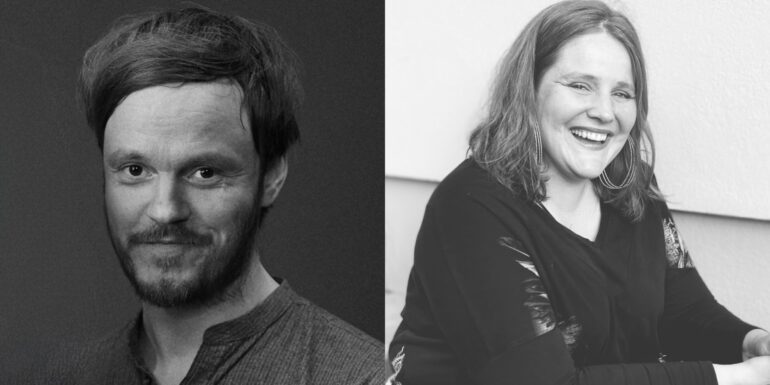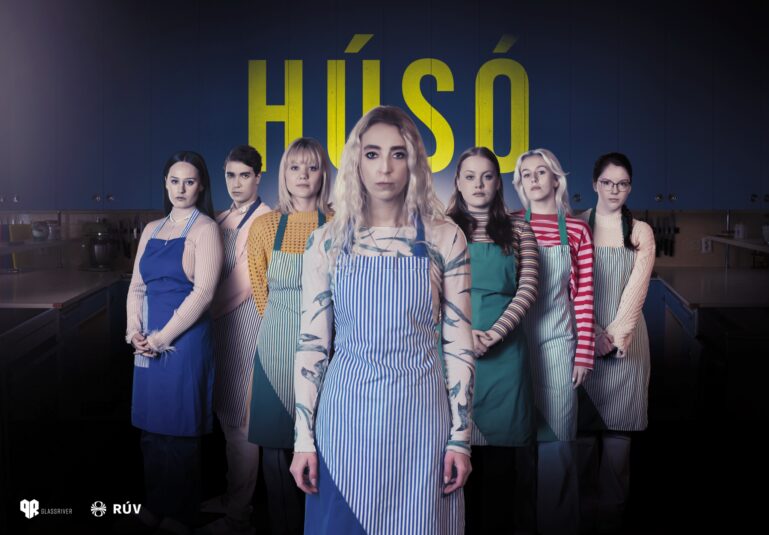Written by: Lina Nystrand
23.01.25
Arnór Pálmi Arnarson and Jóhanna Friðrika Sæmundsdóttir discuss how The School of Housewives is inspired by a real institution in Reykjavík, and how they turned the drama series into the 30-minute format.
Icelandic writers Arnór Pálmi Arnarson and Jóhanna Friðrika Sæmundsdóttir are nominated for the Nordic Series Script Award 2025 for the 6-episode series The School of Housewives (Húsó), in addition to Dóra Jóhannsdóttir (under pseudonym Hekla Hólm).
The drama series follows a young woman who after rehab enrolls in a housekeeping school in Reykjavík in order to eventually get her daughter back from foster care.
The School of Housewives premiered first on RÚV 1 January 2024. The series is directed by Arnór Pálmi Arnarson and the scripts are written by him and Jóhanna Friðrika Sæmundsdóttir. The concept, characters and story were developed by Arnór Pálmi Arnarson, Jóhanna Fridrika Sæmundsdóttir and Dóra Jóhannsdóttir (under pseudonym Hekla Hólm).
The series shares its name with an 80-year-old institution in Reykjavík, Húsmæðraskólinn, which previously inspired the documentary The School of Housewives (2020). The school was originally established to educate women in homemaking skills and prepare them to manage households while men pursued careers outside the home.
The nominated scriptwriters collaborated around answering the questions below.
How did the institution inspire you when writing the drama series?
During the second wave of feminism, the home was sometimes described as a "concentration camp”, as women began to take up more space in the workforce. In more recent times, with the rise of post-feminism, the image of the housewife has been glamorised on social media – portrayed as effortlessly juggling family, work, household tasks, and even education. Times have changed, and so has the school.
However, the values taught at the school remain timeless and deeply significant. At its core, the lessons centre on the basic human need for nourishment, shelter, and stability – things everyone needs in order to to thrive. The protagonist, Hekla, embodies this theme. She grew up in challenging circumstances without a true home. For her, this school becomes a lifeline. Her journey is about breaking free from the relentless cycle of addiction and learning to trust others - and herself.
The creative process began with building characters to populate this world. Since The School of Housewives is a boarding school, it was essential to craft a diverse cast of characters whose interactions would be compelling and relatable. The school also became the perfect setting to explore the topic of addiction – a disease surrounded by stigma, but one that touches countless families, either directly or indirectly.
Can you describe your research and working process around creating and structuring the series?
We started by interviewing people in our circles to hear personal stories – both from those who have battled addiction and from their loved ones.
We also consulted experts in Reykjavík’s social services system, including a staff member from Child Protection Services, whose insights greatly informed the script. We wanted to portray the system accurately and show that it’s composed of individuals doing their utmost to help those in vulnerable positions.
From the outset, we envisioned the series as a 30-minute drama – a format traditionally associated with sitcoms. This presented a significant challenge: condensing a large cast of characters and rich storylines into such a short runtime. In post-production, we often had to pare down subplots to stay within the time constraints, which was painful, but necessary. These lessons have prepared us well for future projects, even if they follow a longer format. Ultimately, we settled on six episodes, in collaboration with the network and producers.
What was the main principle when creating your many female characters?
The principle was simple: to centre around women’s stories, told from their perspectives.
The series is set in a world where women take the lead, and we wanted to portray a strong, interconnected female community. We also felt it was important to represent women across generations.
For instance, we follow Guðrún, a 70-year-old headmistress nearing the end of her career. She struggles with feelings of irrelevance as she prepares to retire and face life at home with her husband, whom she has long avoided by immersing herself in work. We also have Erla, 55, Hekla’s former mother-in-law, who now has custody of Hekla’s daughter. Unlike most people her age, who are enjoying life post-childrearing, she finds herself raising a young child again.
What were the biggest lessons or surprises from writing the series?
The biggest lesson was balancing Hekla’s central story with the side plots of other characters – all within a 30-minute format. Hekla’s journey had to remain the backbone of the series, as the audience’s emotional connection to her was crucial. If that connection wasn’t strong, the series wouldn’t work.
Though the series is a drama, we also discovered the value of humour in diffusing tension. The stronger the drama, the easier it was to introduce moments of levity. The humour always stemmed from genuine characters dealing with real-life challenges, which made it resonate.
Did you both participate in the casting and final edit?
We co-wrote the series, and Arnór Pálmi directed it. While Arnór led the casting process, we worked closely together to ensure the actors captured the essence of the characters we wrote together.
In post-production, Arnór worked closely with the editor, and Jóhanna watched what they had made and gave comments on it. Then they did their best working with it. We also had a focus group consisting of women and men of various ages. They provided feedback on the episodes, which we reviewed together before making final edits.
Looking back: Why did you become a scriptwriter? Have your storytelling dreams come true?
Jóhanna: I have a BA in acting, and earned an MA in creative writing from the University of Iceland seven years ago. During my studies, I took a screenwriting course, and it was a revelation. I became obsessed with cracking the code of good script writing – it felt like solving a complex puzzle or Sudoku. I’ve been working as a screenwriter for the past five years, and in Iceland that is a dream come true.
Arnór: I started making short films as a teenager to tell stories, and soon began working in television. After studying directing, I realised opportunities to direct pre-written scripts were limited, so I began writing my own – and I haven’t stopped since.

